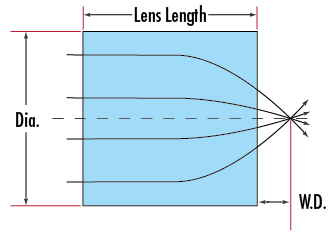
Gradient Index (GRIN) Rod Lenses feature plane optical surfaces and achieve focus via a continuous change of the refractive index within the lens material. By eliminating complex geometries (such as aspherical surface figures) and carefully designing the lenses for specific working distances, these microlenses are comparatively easy to handle and integrate into optical systems. Gradient Index (GRIN) Rod Lenses are designed to provide a 0.55 numerical aperture. These Rod Lenses are available for purchase in 2 working distance options: 0 and 0.23 mm.
Lenses with a 0mm working distance are ideal for the collimation of single and multi-mode optical fibers and laser diodes because the lens can be positioned and glued directly to the emission source. For focusing applications, or in instances where the lens can’t be in direct contact with the emission source, all lenses are available with a small working distance as well. Each lens is available uncoated (approximately 12% reflection loss), or with a BBAR coating option for R < 0.5%.

or view regional numbers
QUOTE TOOL
enter stock numbers to begin
Copyright 2023 | Edmund Optics, Ltd Unit 1, Opus Avenue, Nether Poppleton, York, YO26 6BL, UK
California Consumer Privacy Acts (CCPA): Do Not Sell or Share My Personal Information
California Transparency in Supply Chains Act